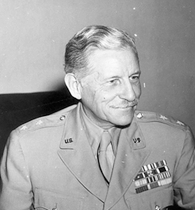Patrick J. Hurley
Patrick Jay Hurley (January 8, 1883 – July 30, 1963) was an American attorney, Republican Party politician, military officer, and diplomat.
He attended Indian College in Muskogee and the National University School of Law in Washington, DC before opening a legal practice in Tulsa in 1908.
Patrick was born near Lehigh in the Choctaw Nation in Indian Territory on January 8, 1883, to Pierce O'Neil and Mary Kelly Hurley.
[2] Dwight Eisenhower, a staff officer in Washington, sent Hurley to Australia with $10 million in cash, to arrange supplies and charters for the Philippines.
In that capacity, Hurley witnessed Marshall Georgy Zhukov's 19 November counter-attack, Operation Uranus, against Axis forces in Stalingrad.
He also reported that the Soviet generals "were interested in the amount of war supplies–especially planes, tanks, and trucks–that the United States [could] furnish Russia" and that they were adamant that a second front needed to be opened soon.
[9] An Iranian-American historian, Abbas Milani, described Hurley as "an odd and eccentric character" who was "horrified" by the "abject poverty amongst the people and arrogant disdain for the populations by the British and Soviet ambassadors.
[9] Hurley often met with Iranian officials, especially the young Shah, Mohammad Reza Pahlavi, who had inherited the Peacock Throne only two years earlier.
[10] Hurley argued that it was wrong for the United States to spend so much blood and treasure in the war to maintain the decaying British Empire, which needed to go.
"[10] Milani suggested that Roosevelt had passed along the report to make "mischief," as he must have known that Churchill would not like Hurley's negative remarks about the British Empire or its role in Iran.
[11] The success of Operation Ichigo brought to a head the long simmering conflict between General "Vinegar Joe" Joseph Stilwell and Generalissimo Chiang Kai-shek.
[21] When Hurley arrived via plane at Yan'an, he was greeted by Zhou Enlai and Colonel David D. Barrett of the American Dixie Mission to the Communists.
[21] When Mao arrived with General Zhu De in a Chevrolet ambulance, Hurley greeted him with a Choctaw war cry "Yahoo!
"[21] During the ride back to Yan'an in the ambulance, Hurley using Colonel Barrett, who was fluent in Mandarin, as a translator exchanged stories with Mao about their rural childhoods.
"[21] Later that night, a banquet was held in Yan'an by the Communist leadership in honor of the Russian Revolution of 1917 during which a drunken Hurley kept interrupting by shouting "Yahoo!"
[22] Mao called for a coalition government, a joint military council with an equal number of Communist and Kuomintang generals, US military aid to the Chinese Red Army, and the freeing of all political prisoners, most notably Marshal Zhang Xueliang, the "Young Marshal" and former warlord of Manchuria who had kidnapped Chiang in 1936, during the Xi'an incident.
[citation needed] An American diplomat, Graham Peck, wrote, "His handsome aquiline head suggested a Roman burst capriciously passed up with butterflies of a huge bow tie, pinch-nose glasses, curly white mustache and coiffure.
[14] Hurley did not speak Mandarin, knew nothing of China, pronounced Mao as "Moose Dung," and had a habit of addressing Chiang as "Mr. Shek" (in Chinese, the surname comes first).
[citation needed] At a dinner with senior diplomats and Chinese leaders, Hurley toasted the journalist Annalee Jacoby, who was present as "the most important person in the world, my tall, blonde goddess of a bride."
[24] The American officers had told T. V. Soong and the War Minister General Chen Cheng of their plans and naively asked them not to tell Chiang.
Although he had started out as a believer in creating a Communist-Kuomintang "united front" in 1944, he was by 1945 a solid supporter of the Kuomintang and regarded anyone who wanted to talk to Yan'an as his "personal foe.
"[28] Hurley fired the diplomats who signed the cable asking for his sacking and went on to accuse "the imperialist governments of France, Britain and the Netherlands" as being the ones responsible for all of China's problems.
[28] Roosevelt's February 1945 Yalta Conference with Winston Churchill and Joseph Stalin resulted in a secret agreement in which the Soviet Union was granted concessions in China that the Russian Empire had lost in the Russo-Japanese War in the early 20th century.
[32] Hurley held out hope that after Roosevelt's death, President Harry S. Truman would recognize what he regarded as the errors of Yalta and rectify the situation, but his efforts in that direction were in vain.
Hurley was the first man to emerge, who in the words of the British journalist Jonathan Fenby had "a broad smile on his face as he waved his fedora hat in triumph," followed by Mao.
Hurley visited Washington in November 1945 to complain to President Truman that too many "China Hands" in the State Department were sympathetic to Chinese communism and/or European imperialism in Asia.
[37] Hurley wrote in his letter of resignation, "I requested the relief of the career men who were opposing the American policy in the Chinese Theater of war.
"[38] In addition to criticizing liberal diplomats, Hurley lashed out against the "imperialist" powers of France, Britain and the Netherlands, whom he accused of seeking to maintain their empires in Asia at the expense of American interests.
[39] Though Hurley had attempted in 1944 to create a "united front" in China and at times had been very sympathetic towards Mao himself, this was forgotten as Hurley reinvented himself as a hard-right Republican who promptly become to American conservatives a "martyr," an honest diplomat who had been undercut by the supposed "fellow travellers" and Soviet spies in the infiltrated State Department's Soviet spies, who had controlled America's China policy.
Shek' and Mao Zedong as 'Moose Dung' in the course of shuttle trips designed to bring the two together to convert China into a springboard for the final showdown with the Japanese.


